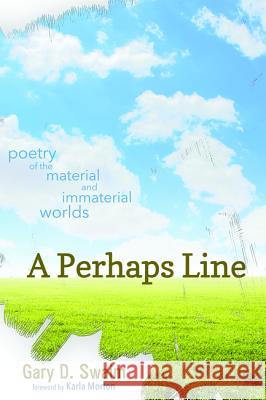A Perhaps Line » książka
A Perhaps Line
ISBN-13: 9781498204156 / Angielski / Miękka / 2014 / 112 str.
A Perhaps Line
ISBN-13: 9781498204156 / Angielski / Miękka / 2014 / 112 str.
(netto: 66,06 VAT: 5%)
Najniższa cena z 30 dni: 68,61
ok. 16-18 dni roboczych.
Darmowa dostawa!
While it is impossible to know how or when a unified view of the self and the universe became divided in our Western view of things, Gary D. Swaim's poems contend that our world is not dualistic. Should we look to Saint Paul or Saint Augustine as responsible for the world's heart rift--even occasional heart drift? More likely, the ""fault"" lies in our habit of seeing things as either physical or spiritual, material or immaterial, for the comfort of categorizing our ideas and experiences into pockets of thought in hopes of exercising a degree of imagined control over the complexities of life. Although this collection is divided into halves, the line separating these sections is porous, or at least permeable . . . Indeed, A Perhaps Line questions whether that line exists at all, with single words, stanzas, images, and even entire poems moving back and forth between the material and the spiritual. Swaim's poems are rough around their edges from passing back and forth through ""a perhaps line,"" uncertain of their places, arbitrarily placed here or there--all partaking of the material and the spiritual in a collection that merges our divided understanding of ourselves and the universe. ""Gary Swaim gives his readers an incarnational poetry. Body and spirit entwine in a tango of gravity and grace, passion, and parousia. Here the poetic muse touches us, sings to us, and transfigures our frailties into the humility of a shared humanity, our fallibilities into opportunities to teach and learn from one another, and our fallenness into the flight of the creative imagination."" --Charles Sullivan, University of Dallas, Irving, TX ""The poems in this little book are a testimony to the human spirit's remarkable ability to transform pain and abject terror into something strangely beautiful and occasionally even funny. Many of these poems were inspired by Gary Swaim's fifty-four day coma and six-month hospitalization in 2006. Others deal movingly with the deaths of his parents and one of his students, while still others fantasize about the inner thoughts of biblical figures such as Adam, Eve, Abraham, Sarah, Hagar, Leah, Job, Jesus, and Mary. All are marked by a childlike sense of wonder at the beauty and mystery of the world."" --Michael McGaha, Pomona College, Claremont, CA Gary D. Swaim is a faculty member in the Master of Liberal Studies Program at Southern Methodist University in Dallas. A Minnie-Stevens Piper Professor of Texas, he has authored chapbooks Rider of Asses and Lighted Matches and is a featured poet in 8 Voices: Contemporary Poetry of the Southwest. He has also written and produced a play based on the life of Dietrich Bonhoeffer.
While it is impossible to know how or when a unified view of the self and the universe became divided in our Western view of things, Gary D. Swaims poems contend that our world is not dualistic. Should we look to Saint Paul or Saint Augustine as responsible for the worlds heart rift--even occasional heart drift? More likely, the ""fault"" lies in our habit of seeing things as either physical or spiritual, material or immaterial, for the comfort of categorizing our ideas and experiences into pockets of thought in hopes of exercising a degree of imagined control over the complexities of life. Although this collection is divided into halves, the line separating these sections is porous, or at least permeable . . . Indeed, A Perhaps Line questions whether that line exists at all, with single words, stanzas, images, and even entire poems moving back and forth between the material and the spiritual. Swaims poems are rough around their edges from passing back and forth through ""a perhaps line,"" uncertain of their places, arbitrarily placed here or there--all partaking of the material and the spiritual in a collection that merges our divided understanding of ourselves and the universe.""Gary Swaim gives his readers an incarnational poetry. Body and spirit entwine in a tango of gravity and grace, passion, and parousia. Here the poetic muse touches us, sings to us, and transfigures our frailties into the humility of a shared humanity, our fallibilities into opportunities to teach and learn from one another, and our fallenness into the flight of the creative imagination.""--Charles Sullivan, University of Dallas, Irving, TX""The poems in this little book are a testimony to the human spirits remarkable ability to transform pain and abject terror into something strangely beautiful and occasionally even funny. Many of these poems were inspired by Gary Swaims fifty-four day coma and six-month hospitalization in 2006. Others deal movingly with the deaths of his parents and one of his students, while still others fantasize about the inner thoughts of biblical figures such as Adam, Eve, Abraham, Sarah, Hagar, Leah, Job, Jesus, and Mary. All are marked by a childlike sense of wonder at the beauty and mystery of the world.""--Michael McGaha, Pomona College, Claremont, CAGary D. Swaim is a faculty member in the Master of Liberal Studies Program at Southern Methodist University in Dallas. A Minnie-Stevens Piper Professor of Texas, he has authored chapbooks Rider of Asses and Lighted Matches and is a featured poet in 8 Voices: Contemporary Poetry of the Southwest. He has also written and produced a play based on the life of Dietrich Bonhoeffer.











